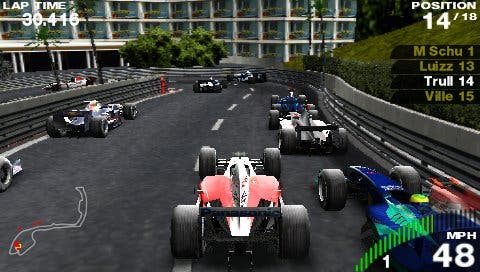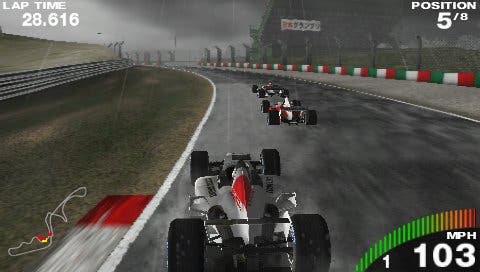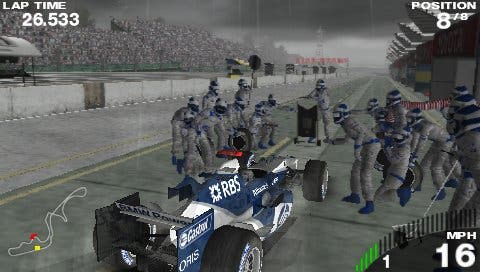Formula 1 Grand Prix
Wow, a PSP racing game!
Fans of radio in the UK will probably be familiar with the concept of a "micro-sleep". According to the health warning played across the nation, it's the sensation of dozing off for a couple of seconds when you close your eyes; long enough, the radio-science-man said, to stray into oncoming traffic while driving and cause a nasty accident. It's something to do with a build-up of fatigue brought on staring at the horizon and rarely having to apply yourself to the situation. Micro-sleeps can kill. Or, when you happen to be playing F1 in a state of some weariness, can cause you to overshoot turns and lose pole position at Monza.
Granted, it took quite a build-up of fatigue before we did actually fall asleep playing F1 Grand Prix - but the fact that it happens feels like a good point to come in on because, for all its many features and seemingly sensible design decisions, this is never likely to keep you up at night. It lacks that vital spark.
First things first: while that is true, it's not because it's been dumbed down for the PSP. Although it has been dumbed down. F1 games usually give you pages and pages of tweaking options - and pages and pages of tutorials to understand each of the pages and pages of tweaks. F1 Grand Prix gives you three options: one for aggressive driving (less grip), one for defensive driving (more grip), and one in-between. There's also an option to have the game assist you with braking. It's very uncomplicated; clearly designed to be played on the go, as you'd expect.
But it doesn't overdo this too much. While it's easy to right yourself by jamming the accelerator and turning quickly to swivel more or less on the spot (get in a real pickle and you'll lose three seconds as it resets you to the track automatically), it won't turn you in for every corner like some of the PS2 games (particularly F1 2004, which seemed to think steering should be optional), and you soon have to learn the ins and outs of your chosen set-up's traction to stay on the tarmac. A big wide long right-hander, for example, can happily take full throttle, but try and do that sharp up-hill left turn on Suzuka by braking quickly then flooring it in the other direction and you'll just wind up spinning off into the gravel. That jam-the-gas-to-spin stuff can upset your direction as easily as righting it.

The actual trouble, though, is that it can't really escape what it's about, and the PSP can't be easily used to make what it is very exciting. F1 is about clever technical driving at very high speeds. F1 Grand Prix gets the sense of speed right, but that just undermines the sense of actual racing. These are bloody nippy cars. So nippy that half the time you're better off with the directional pad than the analogue nub for steering because the cars will squirrel around given half a chance - and the analogue nub poses no resistance, so it's like wrenching a joystick side to side. Because it all happens in a flash and you're not equipped with analogue acceleration or braking, you tend to just ram into other cars, and their tactics of trying to block you off inevitably just lead to collision. The act of racing nose-to-tail with other cars, which are rarely moving at the same speed as you thanks to the way the difficulty scale works, quickly becomes quite jarring. You just want to get clear of them.
At which point your eyes start to droop.
It makes us cross that this happens, but frankly we're not too sure who to direct that frustration toward. You can't really judge Traveller's Tales too harshly for the way this has turned out. It has to look like F1, so it aims for low-level PS2 in technical terms, and as a result it can't really look exciting the same way that stylistic games like WipEout can. The blocks of spectators look like low-resolution blocks of colour massed together, and even the more exotic-looking tracks like Shanghai and Monaco are rendered rather unexciting - presumably by the need to keep the total number of cars up. And of course it has to feel a bit like F1, so it can't use the nature of the driving model to keep your nerves jangling in the same way Ridge Racer can with its stupendous head-twirling power-slides.

It's totally unsurprising. It flirts with an arcade mentality, but it flirts with all the conviction of a manic-depressive. It knows what it is.
It has all the right tracks, it has all the right drivers and liveries, it will probably let you download new ones for the 2006 season (if not data on a race-by-race basis), it has a trio of difficulty levels to work through, a few other cars to unlock, and Wi-Fi multiplayer. There's also a scenario mode, which asks you to perform racing miracles. For example, getting to the pits with failing brakes, or maintaining position on the last lap of Monaco as dark fog descends. Performing the early miracles is a bit like being Jesus with GOD mode on, but some of the later ones will keep you plugging away. It's a pity there aren't a few more of them, really, as we liked this side of the game.
Ultimately though, it's just an F1 game. And because the PSP has forced it to downsize some of its technical accuracy and pitch in at a lower visual standard, it's forced to rely on its racing model - and its racing model is a bit squirmy and lacks flair.

With so many racing games due out on PSP before the end of September (at last count, F1 is up against WipEout, Ridge Racer, TOCA 2, Colin McRae, WRC and Burnout Legends), we're being forced to ration our racing puns, but, if we must, it's hard to imagine this making it to the front row of the grid. Or even the second. If you want some F1 to send you to sleep, try the Sunday afternoon version on ITV. It's a lot cheaper, too.

